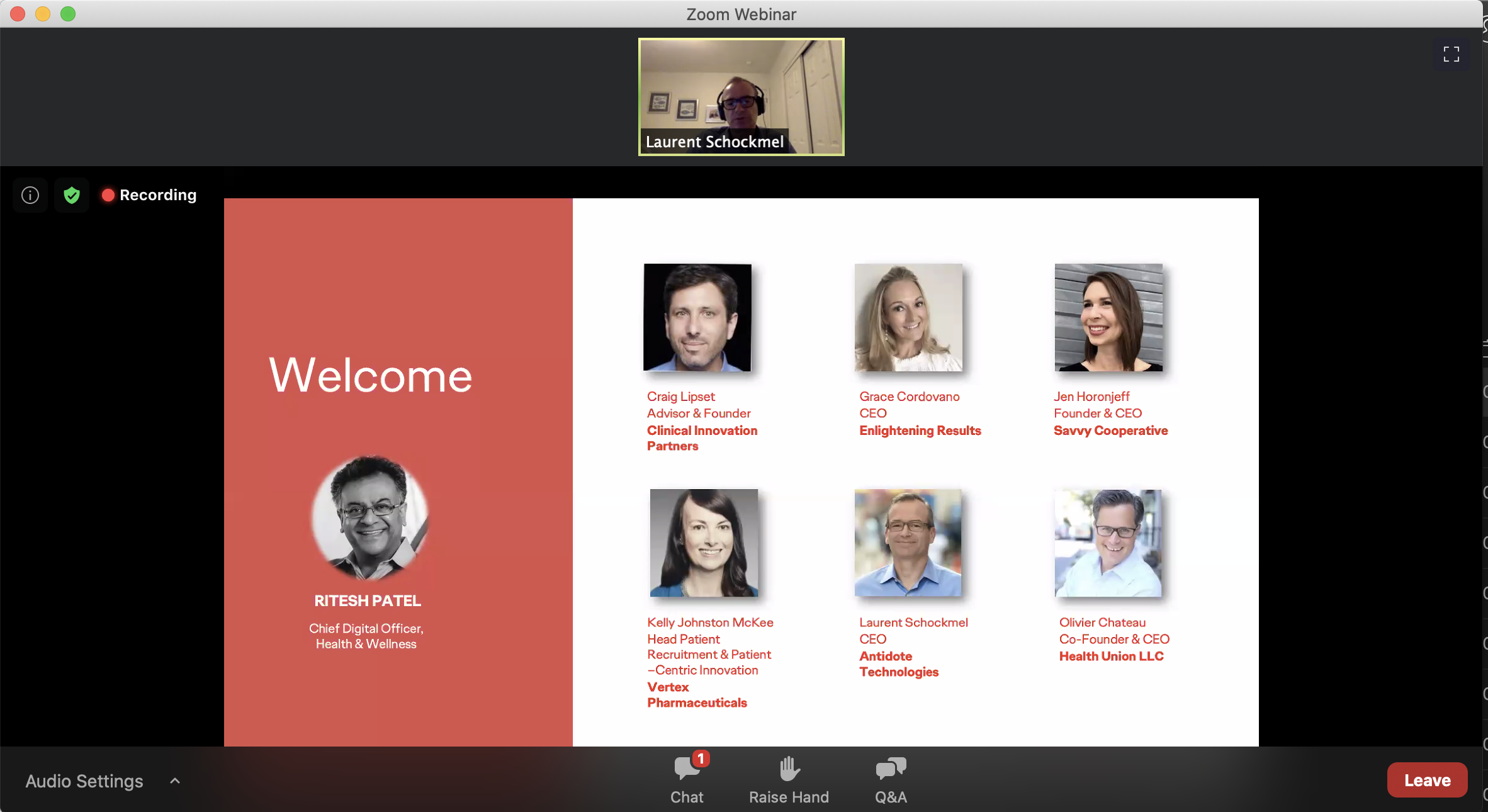Webinar recap: Changing the paradigm of patient centricity

With what we’re learning from the COVID-19 pandemic, can we create a permanent solution to keep the patient at the heart of clinical research? Last week a panel of experts, including our CEO, Laurent Schockmel, teamed up for an Ogilvy Consulting webinar, during which they discussed key industry considerations when it comes to putting patient centricity into action.
The panel included:
- Ritesh Patel, Chief Digital Officer, Health and Wellness, Ogilvy Consulting
- Craig Lipset, Advisor and Founder, Clinical Innovation Partners
- Grace Cordovano, CEO, Enlightening Results
- Jen Horonjeff, Founder and CEO, Savvy Cooperative
- Kelly Johnston McKee, Head of Patient Recruitment and Patient-Centric Innovation, Vertex Pharmaceuticals
- Olivier Chateau, Co-Founder and CEO, Health Union
- Laurent Schockmel, CEO, Antidote Technologies
The webinar is available on-demand here: https://vimeo.com/429093380. Below, we break down the key elements of the discussion.
What is patient centricity in clinical trials?
This webinar sought to break down the changing paradigm of patient centricity, especially in the wake of the COVID-19 pandemic. At the heart of it, our CEO, Laurent, says that patients want to be heard, and also want to be able to understand clearly what the sponsors are looking for. At Antidote, we do this primarily through our relationships with advocacy groups representing patients in all conditions from chronic to rare diseases. How are these patients alike? How are they different? What do they need? Patient centricity is about first listening, then learning.
That’s why Antidote conducted a survey of 4,000 patients — to listen and to understand what would make patients feel like stakeholders rather than subjects in research. The number one response? “Make it easier for me to learn about clinical trials.” Survey respondents also wanted easier access to information about clinical trials, study findings, and the details of what a study involves.
This sentiment was echoed by the other panelists, too. Jen Horonjeff of Savvy Cooperative argued that the term “patient centricity” itself doesn’t mean much; it’s all about action and feedback. Craig Lipset said that this all has to start with patients: If you’re not listening, how do you know what your patients want or need? He noted that people are more willing to participate in research today, but it needs to start meeting their needs. Kelly Johnston McKee, of Vertex Pharmaceuticals, pointed to patient-facing websites as an effective direct to patient strategy to share trial details in a straightforward way.

Patient communities and simplification both go a long way
Two key ways to ensure the patient voice is heard in all aspects of medical research are 1) to work with patient communities, and 2) to simplify medical jargon so that everyone can participate in the conversation.
As Laurent put it during the webinar, advocacy groups are meeting patients where they are, providing critical information to engaged patients. In Antidote’s survey, it was interesting to see where people want to hear about trials, versus where they actually do. It turns out that patient advocacy groups are providing opportunities where and when patients want them — they’re doing the best job here. Olivier Chateau of Health Union agreed: In his patient communities, “when people come to communicate with each other, the ones that are research-ready are vocal. Bring the trial to the patient, instead of making the patient find and get to the trial.”
Beyond finding a trial, another big barrier to patients is that available data on websites such as ClinicalTrials.gov is not patient-friendly and does not provide a positive experience for patients. That’s why we’ve developed Antidote Match, which helps people quickly find trials by answering questions about their condition. We capture this data so we can offer other trial options tomorrow should they be ineligible for options today. At the heart of this work is ensuring each patient has a good experience when they’ve decided to take part in a clinical trial.

How can we get the idea of “research ready” running?
One notion championed by patient advocate Grace Cordovano was the idea of “research ready,” which as she explained it is essentially providing the opportunity for patients to raise their hand to take part in a trial, perhaps even before they are sick. This would be akin to an organ donation designation. The panel agreed that if we want to do something like this to encourage understanding of and participation in research, we need to commit the time and money to ensure patient centricity.
For Laurent, “Dedication to research means also dedication to the service of patients. As of late, people are seeing research in a more positive light, so money to create awareness of trials is important. And after that, we need the structure and organizations to bring patients into clinical trials.”
The other panelists reiterated the importance of time and budget to drive patient centricity and the idea of “research ready” patients. Jen urged the panel to “make a commitment to yourself and your organization that you’re going to do the work and spend the money. Nobody wants these things to be successful more than patients. They feel the fire even more than you do.”
For Olivier, the potential outputs of research readiness could have an incredible impact on people. “COVID has brought to the forefront the fact that when we are determined to make something happen, we can make it happen. The question will be how can we take the good that’s been done and bring it to any research project. I think it’s going to be really critical to make this happen practically.”
It’s hard to find a silver lining to this pandemic, but perhaps the worldwide attention given to clinical trials will emerge as one. As Laurent shared during the webinar, at Antidote, we’ve only had a handful of patients indicate they are not comfortable with participating at this time. And in terms of digital recruitment trends, since the pandemic began, we’ve seen an increase in ad engagement rates of 23% and an increase in registration rate of 84%.
As interest in medical research continues to build, ensuring patients are at the heart of clinical trials should be a necessity and a priority.
Topics: For Sponsors

